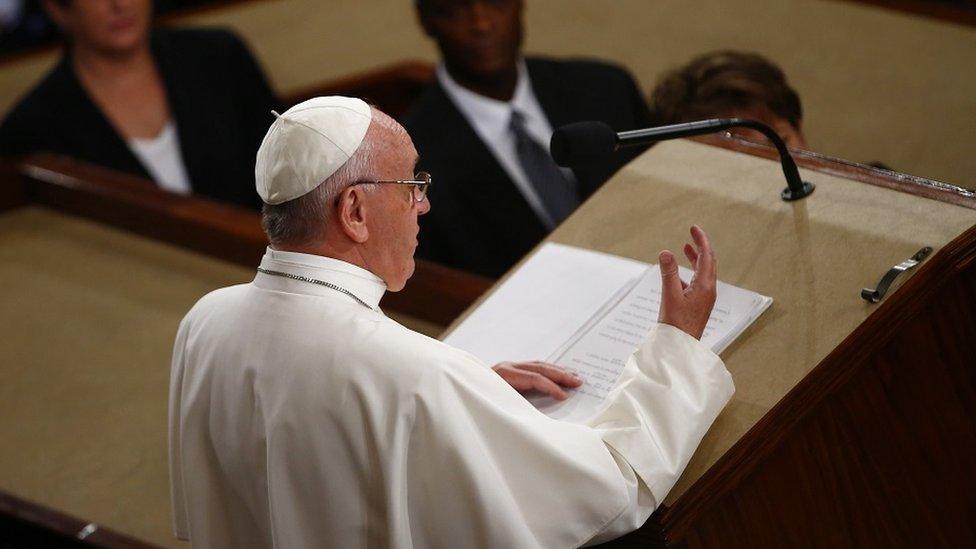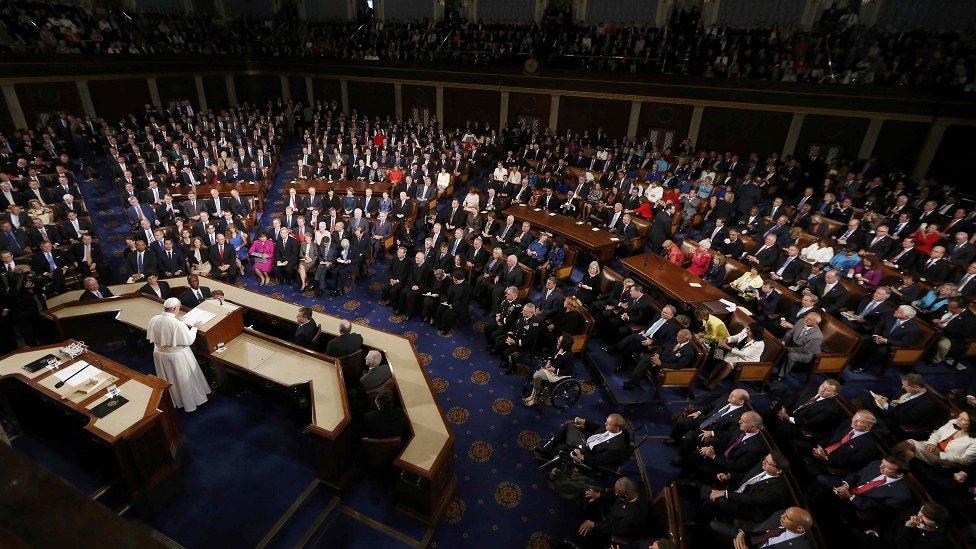Pope urges 'humane' US migrant response
- Published
"Let us remember the golden rule - do unto others as you would have them do unto you", said the Pope
Pope Francis has told the US Congress that the US must see migrants as "persons" and not as "numbers".
Speaking to a rare joint session, the Pope said immigrants should be treated "with the same passion and compassion with which we want to be treated".
In the same address, the pontiff renewed his call for ending the death penalty, and for better treatment of the poor and disadvantaged.
He was warmly greeted by 500 lawmakers, justices and officials.
After entering the chamber to thunderous applause, he said the world is facing a refugee crisis of a magnitude not seen since World War Two, and noted the immense challenges that the crisis presents.
But he drew particular attention to the movement of migrants from Central America to the United States in search of a better life - a reference which drew a standing ovation.

"We must not be taken aback by their numbers, but rather view them as persons, seeing their faces and listening to their stories, trying to respond as best we can to their situation," he said.
For years, hopes of wide-reaching immigration reform have been dashed by political disagreements in Washington.
And President Barack Obama's attempt to allow 11 million undocumented immigrants to avoid deportation has been stalled by a legal challenge.
Also in the speech:
the world must be attentive to "fundamentalism, whether religious or of any other kind"
on economic inequality, he said "even in the developed world, the effects of unjust structure and actions are all too apparent"
renewed calls for "the global abolition of the death penalty" saying criminals should be rehabilitated
he reaffirmed his "esteem and appreciation" to the indigenous people of the Americas who faced "turbulent and violent" contacts with colonising powers
the "very basis of marriage and the family" is being called into question, in a thinly veiled warning about same-sex marriage
he called on Congress to be inspired by Moses and promote unity through "just legislation"

Analysis: Caroline Wyatt, BBC religious affairs correspondent
It was impossible from this speech to categorise the Pope as left or right, as so many have sought to before he arrived.
There was something for everyone, Democrat and Republican alike, as he called on America to put an end to the death penalty - a cause for the left - and defended all life as sacred, a rallying call for the anti-abortion right.
That was a sentiment greeted with loud cheers by Republicans opposing laws on family planning that currently threaten to gridlock the US government.
Above all, Pope Francis in the US has challenged his audiences to think, and to cast aside ideological divisions in favour of unity and mercy - to reflect on how to help the poor and those without.
This is a Pope that all sides are keen to claim as their own, but he remains hard to pigeonhole, as he went on to eat a meal not with the political elite but with the poor and the homeless who are ever present here, in the capital of the world's richest nation.
Then, he left in his small car that makes a big point about the environment, showing that sometimes, actions can speak louder than words.

The pontiff also highlighted the work of several famous Americans including Abraham Lincoln and Martin Luther King, and said even amid conflict they provide inspiration.
After finishing with the words "God bless America", the Pope received a prolonged standing ovation.
But there was some dissent from presidential candidates.
Shortly after the address, Republican Senator Ted Cruz said he disagreed with the Pope, external about the death penalty, saying it was "a recognition of the preciousness of human life".

Over 500 lawmakers and senior members of government were in attendance

Four Americans praised by Francis:
former US president Abraham Lincoln, the "guardian of liberty, who laboured tirelessly that this nation, under God, [might] have a new birth of freedom"
"I think of the march which Martin Luther King led from Selma to Montgomery 50 years ago as part of the campaign to fulfil his 'dream' of full civil and political rights for African Americans...That dream continues to inspire us all."
on Dorothy Day, who founded the Catholic Worker Movement in 1933, he said: "Her social activism, her passion for justice and for the cause of the oppressed, were inspired by the Gospel, her faith, and the example of the saints."
Cistercian monk Thomas Merton, who wrote more than 70 books on spirituality and social justice, "was above all a man of prayer, a thinker who challenged the certitudes of his time and opened new horizons for souls and for the Church"

The 78-year-old Argentine pontiff then appeared on a balcony at the Capitol and spoke in Spanish to thousands gathered on the West Lawn, and asked Christians and non-Christians alike to pray for him.
After leaving Washington, the Pope flew to New York. During a service at the city's St Patrick's Cathedral he expressed his "sentiments of closeness" with Muslims following the stampede that killed at least 717 pilgrims at the Hajj in Mecca earlier on Thursday.
On Friday he will address the UN General Assembly, visit the 9/11 Memorial and celebrate Mass at Madison Square Garden.
The Pope is on his first official visit to the US and has sought to bring Catholics back to the Church with a more inclusive message. He has drawn massive crowds.